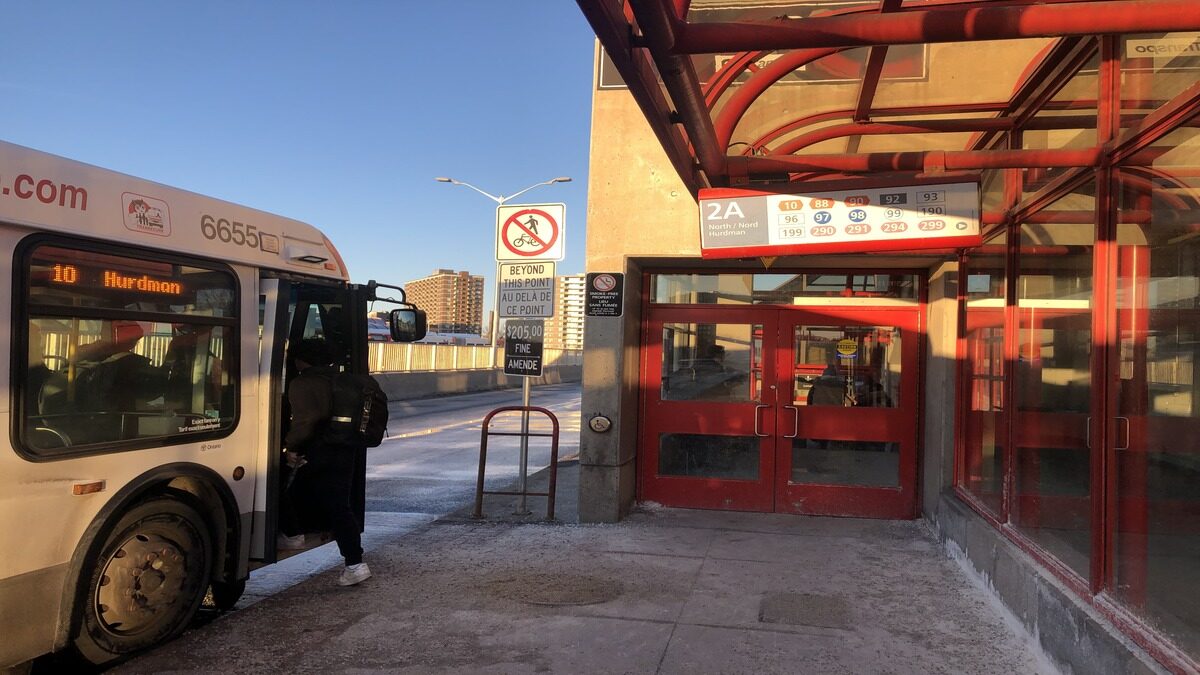Kate Allsebrook is a fourth-year student at Carleton University who takes the No. 10 bus to Hurdman station in her commute to campus and back home. Allsebrook has noticed delays in the bus frequency for a while.
“Sometimes it does not show up, and I wait for the next slot,” she said.
Given her experience — a frustration felt by many Ottawa transit users — Allsebrook said it’s worrisome that imminent approval of the 2023 OC Transpo budget will likely lead to even worse service.
“It is not fair,” Allsebrook said. “It is just going to make this negative feedback loop. … If you improve public transit and make it acceptable, make it affordable, you will have more people using it.”
The city’s transit commission has voted to support $47 million in proposed cuts to the capital budget of OC Transpo. That includes taking out of service — without replacement — 117 buses in poor condition. City council will rule on Transpo’s draft budget on March 1.
‘The solution is not to further cut service. The solution, in fact, is to increase the frequency and add some bus lines.’
— Nick Grover, Free Transit Ottawa
The transit crunch comes after Ottawa Mayor Mark Sutcliffe introduced the city’s 2023 spending plan — with a range of proposed savings and efficiencies — as “a tight budget.”
The Ottawa Coalition for a People’s Budget, a broad alliance of individuals and community groups, is ringing alarm bells over threatened cuts to services, they say Ottawa residents need. The coalition includes organizations such as Horizon Ottawa, Free Transit Ottawa and Ottawa Transit Riders.
“The solution is not to further cut service. The solution, in fact, is to increase the frequency and add some bus lines,” said Nick Grover, a member of Free Transit Ottawa. “It is not bold to say everybody is impacted one way or another.”
The cut is coming from the capital budget, which means upfront investments that could include anything from new buses to new bus routes to improved bus stops.
Grover added that the planned cut effectively means less capacity in the transit system, fewer buses on the roads and less frequency.
“That is quite the opposite of what we need,” he said, rejecting the logic that says low transit ridership means the city should invest less in the system. “The riders could be there if they invested in the service.”
The city’s climate change plan aims to reduce emissions from city operations by 50 per cent by 2030. Grover said what the city is doing, contradicts the climate change plan because it will force more people to drive by impoverishing the public transit system.
“That is not good for the climate, and that is no good for drivers,” Grover said. “It is the air that everyone breathes.”
‘People are going to quit using public transit if the service is going worse.’
— Sam Hersh, spokesperson, Horizon Ottawa
Khulud Baig, another member of the Ottawa Coalition for a People’s Budget, said planned cuts are not considering the interests of vulnerable local residents who are marginalized.
“It impacts the population who rely on transit the most,” said Baig, listing “people who cannot afford cars, families who cannot afford to pick up their kids from schools, the newcomers and seniors who cannot afford alternatives.
“Any sort of under-investment in transit can mean that people are just being kept away from a transit infrastructure … that actually can serve their needs.”
Baig said Ottawa already has a transit affordability crisis.
“Transit is very expensive to take if you are a family of four or five where all people are taking transit,” she said. “On top of that, when we see, for example, a train derailing or a station not working, that further takes away people’s trust in transit infrastructure.”
Sam Hersh, a board member of Horizon Ottawa, said the problems with public transit are a result of years of political choices.
“Not because it is expensive or the rider level is low. They have made the service worse because they continue underfunding it,” he said.
“Comparable cities, such as Calgary, Edmonton and Vancouver, are similar … in terms of population. They have over 1,000 buses, but they are also smaller geographically.”
“They are saying it will not affect service. It will,” said Hersh. “We have already seen a lot of cancelations. People are going to quit using public transit if the service is going worse.”





The 2023 budget does not cut money from transit operations. In fact, the operations line in the budget will increase to $567 million, an increase of $27.5 million compared to 2022, or about a 5% increase.
It’s true that capital spending has been cut by $47-million compared to 2022, but much of that is for deferral of projects that aren’t required this year and can be delayed until a future budget year. Unfortunately this change to the capital budget plan is being incorrectly characterized by Horizon Ottawa and others as a cut to service. It is not.
OC Transpo plans to hire 360 new operators in 2023, and will not reduce service compared to 2022. There’s room in the budget to add additional service on routes where there is high demand.
The budget also freezes OC Transpo and Para Transpo fares for 2023, and the cost of the EquiPass for low-income residents and the Community Pass for Ontario Disability Support Program recipients will remain frozen at 2018 rates.
Readers can find more information at:
https://www.glengower.ca/information/transit-commission-approves-oc-transpos-2023-draft-operating-and-capital-budget/
and
https://www.glengower.ca/notebook/notebook-my-opening-remarks-at-transit-commission/
I hope that Capital Current can provide some clarification to the original article.
Glen Gower
City Councillor & Chair of the Transit Commission